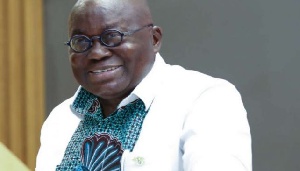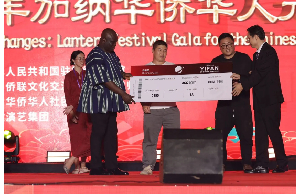The National Health Insurance Scheme (NHIS), which, under the Mahama government, was being strangled by debt is being revived says President Nana Addo Dankwa Akufo-Addo.
According to President Akufo-Addo, “of the GH¢1.2 billion debt we inherited, the equivalent of $300 million, we have paid, in the last 15 months, GH¢1 billion, the equivalent of $250 million.”
He added that payments to service providers, since his government took office in January 2017, are current.
As a result, “the Scheme is regaining its effectiveness, so that for a minimum amount, subscribers can have access to a wide range of medical services.”
President Akufo-Addo made this known on Saturday, 21st April, 2018, when he delivered the keynote speech at the London School of Economics’ Africa Summit, on the theme “Africa at Work: Educated, Employed, Empowered.”
Addressing a packed gathering, President Akufo-Addo noted that the urgent responsibility confronting the continent is to make African countries attractive for African youth, and for them to see the Continent to see as places of opportunities.
“It means we must provide education, quality education and skills training. It means our young people must acquire the skills that run modern economies,” he said.
The President indicated that with the African Union’s Agenda 2063, titled The Africa We Want, calling for an education and skills revolution to meet the human resource needs for inspiring Africa’s socio-economic development, he noted that the AU has, quite correctly, placed high premium on science, technology and innovation as critical ingredients to the achievement of Agenda 2063.
“The provision of education for our young people should not become an ideological tussle. We should never have to make a choice between basic education or higher education. We should never have to rely on the World Bank or any other institution to decide for us where the emphasis should be in our education needs,” the President said.
Whilst stressing that education is the key to Africa’s development, he noted that African countries must run their economies to be able to fund the education of African children.
“We should not get into arguments with donor agencies about our priorities. We must set our own priorities, and we must accept that we should provide the funds to translate our plans into reality,” he said.
The President continued, “That is why, despite the bleak economic situation my government inherited, we decided to implement immediately the pledge we had made about providing Free Senior High School education. The most dramatic aspect of its implementation has been that 90,000 more students entered senior high school in September last year, the first term of the policy, than in 2016.”
He was confident that “if we stop being beggars, and spend Africa’s monies inside the continent, Africa would not need to ask for respect from anyone. We would get the respect we deserve.”
President Akufo-Addo also revealed further that, in Ghana, whereas the indications are that the economic dividends are on the horizon, there are other areas where the nation is thriving.
The media in Ghana, he said, has come into its own, and what used to be called the culture of silence has been replaced with a cacophony that now worries some.
“I have said it before, and I believe it bears repeating, I would much rather put up with a reckless press than a monotonous, praise-singing one. A democracy has no place for a media that does not keep public authorities on their toes,” he added.
He stressed that “I am a firm believer in a strong and vibrant media, and I have no doubt that it is a force for good, no matter how irritating and how irksome they can be and often are. They provide the avenue for the other point of view.”
In concluding, he indicated that “our success story and changed narrative come with building our economies that are not dependent on charity and handouts. Then we shall put an educated, employed and empowered Africa to work, and repudiate the recent culture of failure. We shall then take our rightful place in the world.”
General News of Sunday, 22 April 2018
Source: ghanaguardian.com
We have cleared GHC1bn of NHIS debt – Akufo-Addo announces
Entertainment












